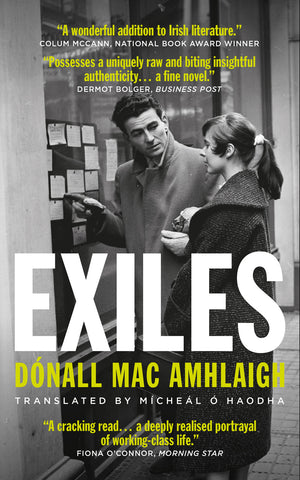Translated by Mícheál Ó hAodha
‘A wonderful addition to Irish literature.’
– Colum McCann, National Book Award winner
'A cracking read ... a deeply realised portrayal of working-class life.' Morning Star
'Possesses a uniquely raw and biting insightful authenticity ... a fine novel.' Business Post
'This great novel is his best achievement, richly translated for
the first time. It captures those times of hardship, of fun, of love
and of spite perfectly, when the Irish were "building up and
tearing England down".' Alan Titley
‘I cannot stress strongly enough the importance of
bringing this work to a wider readership.’
–Tony Murray, Director, Irish Studies Centre,
London Metropolitan University, London
‘Donall Mac Amhlaigh is the most perceptive and
informed writer on the Irish in 20th century Britain.’
– Professor Enda Delaney, author of The Irish in Post-War Britain
Two Irish migrants on the cusp of new lives in post-war Britain. Two young people who dare to dream of a better life, and dance the music of survival in their adopted homeland.
Afraid that his wife and children will arrive over any day, Trevor is in a hurry to settle old scores with his rivals and to prove himself the top fighting man within his London-Irish community of drinkers and navvies while Nano seeks to escape the stifling conformity and petty jealousies of her peers and forget her failed love-match at home. Will Trevor finally prove himself “the man” and secure the respect that he feels is his by virtue of blood and tribe? Does Nano have it in her to break free of the suffocating bonds of home and community and find love with Lithuanian beau Julius?
Written at a time when the Irish were “building England up and tearing it down again,” and teeming with the raucous energy of post-war Kilburn, Cricklewood and Camden Town this novel is one of the very few authentic portrayals of working-class life in modern Irish literature.
Up to one in four UK citizens claims Irish heritage. For each decade of the 1950s alone – a time of British postwar boom and Irish economic decline – over half of Ireland’s population, those coming of age in that decade, emigrated: the majority to England. And while Irish-owned companies today account for one tenth of the almost £100bn British construction industry, those navvies who built our homes, roads and hotels comprise a forgotten generation, alongside the nurses that made the crossing alone to power our nascent Welfare State.
Dónall Mac Amhlaigh was among them, working on construction
sites throughout London and the Midlands, including the M1 and M6
motorways. In this autobiographical novel are the people who later
calcified into stereotypes of Irish immigrants and their haunts: the
navvy, the drinker, the fighter, the nurse. As with the Polish builder,
Romanian gangster or Spanish nurse of today, such caricatures have
their source in real lives adapting to economic reality.
Dónall Mac Amhlaigh (1926-1989) was one of the most important Irish-language writers of the 20th century. A native of County Galway, he is best known for his novels and short stories concerning the lives of the more than half-a-million Irish people who left Ireland for post-war Britain.
A prolific journalist and a committed socialist in the Christian Socialist tradition, Mac Amhlaigh, whose diaries and notebooks are held in the National Library of Ireland, was a member of the Connolly Association in Northampton and contributed regularly
to newspapers such as the Irish Press and a range of journals on both sides of the water throughout the 1970s and 1980s often providing the perspectives of the Irish in Britain on issues such as class, economy, emigrant life in England, the conflict in
Northern Ireland and civil rights-related issues.
Mícheál Ó hAodha is an Irish-language poet from Galway in
the west of Ireland.

